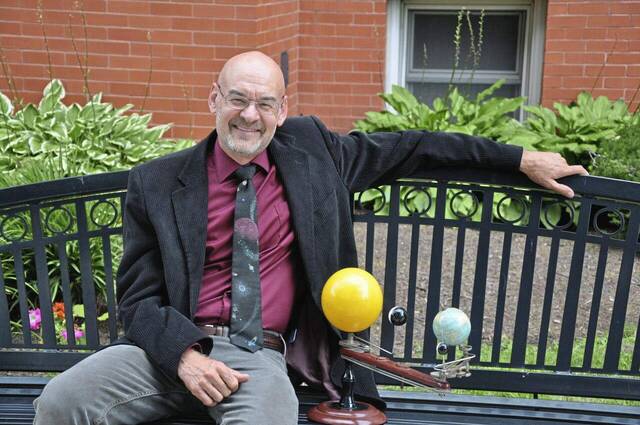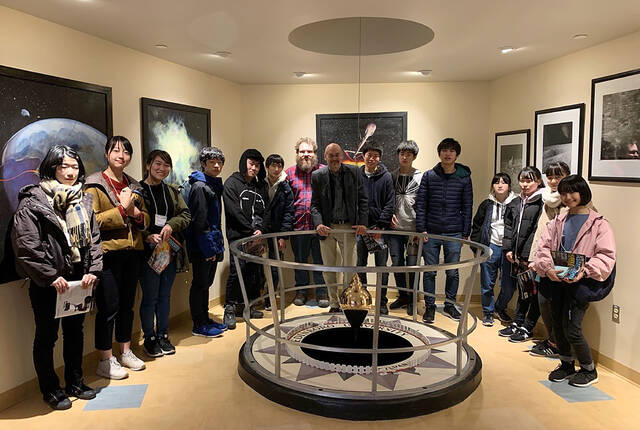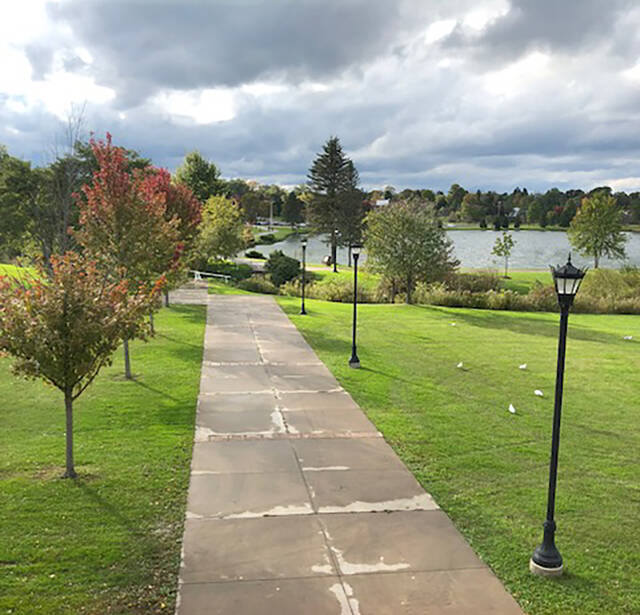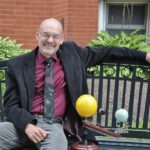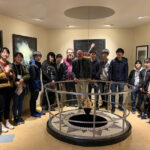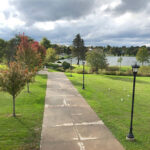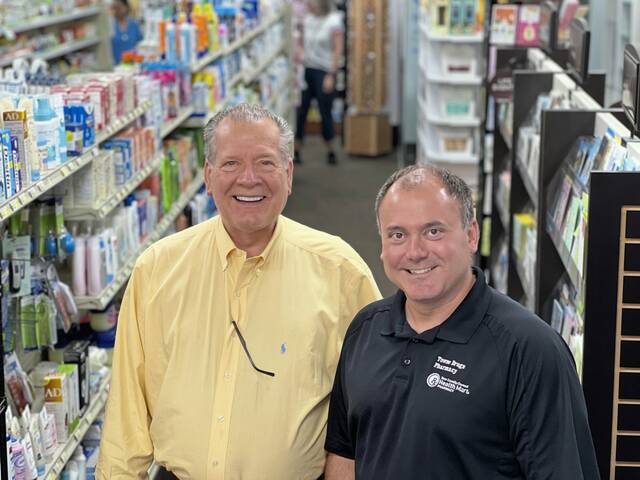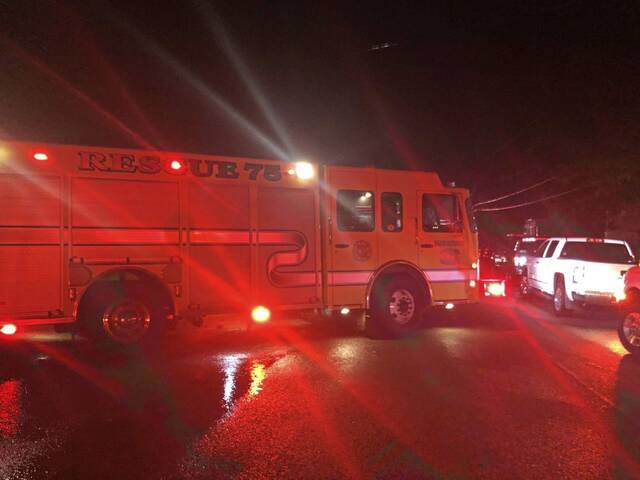David Hurd’s excitement over what’s about to happen in the skies above him is obvious when he speaks. It even comes through in his voicemail these days.
“We are so excited for April 8,” says the recorded message from Hurd, a geosciences professor and director of the planetarium at PennWest University Edinboro.
And, really, why wouldn’t he be ecstatic?
After all, the professional astronomer has spent 34 years extolling the wonder of celestial events, including solar eclipses, to students of all ages, including those who are blind or visually impaired. He has collaborated with others on NASA-backed efforts to develop tactile books so they can use other senses to experience what they cannot see.
Now, Hurd is set to experience the ultimate payoff: a total eclipse on his own campus. “The Great North American Solar Eclipse” is a tourist event, for sure, given the tens of thousands of people who will travel long distances and book hotel rooms to be in its path.
But for educators like Hurd, 61, it’s also an extraordinary opportunity to bring classroom science to life.
Like his colleagues on other campuses that are in or close to the path of totality, Hurd is more than ready.
“I’ve been talking about this to my classes for literally decades,” he said of the upcoming full eclipse.
Over the years, Hurd has chased his share of eclipses across the U.S. and beyond.
“I went to Romania in 1999 for two minutes and three seconds,” Hurd told TribLive. “Then, in 2017, I went to Grand Island, Nebraska, for two minutes and 33 seconds. Wow!”
Of course, he wasn’t referring to the duration of those trips, but rather the payoff in minutes and seconds of totality that he witnessed by traveling thousands of miles to be in its path.
On April 8, he’ll only have to step outdoors on campus to view three minutes and 18 seconds of totality. That’s when the moon’s shadow completely obscures the sun and an atmospheric layer called the corona, normally obscured by the sun’s bright light, becomes visible.
The only question mark is whether clouds will move in and spoil the show.
“No one can control that,” Hurd said.
On the day of the eclipse, having done all he can to educate students and the general public about the phenomenon, Hurd will head to Mallory Lake — a body of water behind the Pogue student center — and join a crowd witnessing history together, many of whom will bring lawn chairs and blankets.
Solar eclipse viewing glasses are being distributed. Food trucks will join the party.
The campus is buzzing with anticipation. A page on PennWest Edinboro’s website displays a digital clock counting down the days, hours, minutes and seconds. Other campuses in or near the path of totality are doing the same.
At Penn State University’s Behrend campus, Jim Gavio, director of the Yahn Planetarium, can be seen in a TikTok video offering safe ways to view the eclipse. Thiel College is using the event to further entice prospective students to visit campus, beckoning to them on its website to “Come for the Tour, Stay for the Eclipse.”
Allegheny College in Meadville plans a celebration in its Robertson Athletic Complex, with the first 500 people being offered free protective eclipse eyeglasses. The school promises astronomy-themed music, concessions, as well as a merchandise trailer selling T-shirts and glow-in-the-dark cups.
Gaining national attention
A native of Gilbert, Iowa, Hurd was educated in the Midwest, receiving a bachelor’s degree in geology from Iowa State University and a master’s in science education from University of Nebraska. He went on to earn his doctorate from Cleveland State University.
He has gained national attention for making science accessible to those with disabilities. On the PennWest Edinboro campus, he is known for bringing humor and enthusiasm to his undergraduate courses. His honors include an Emmons Award through the Astronomical Society of the Pacific, which recognizes outstanding efforts to teach college-level introductory courses for non-majors.
Yet, a career in the classroom was not what he originally planned, he told an interviewer with the United Nations Office for Outer Space Affairs.
“I knew by the time that I was in eighth grade that I wanted to be a geologist. I did not intend to be an educator and rather imagined myself as a field geologist, working by myself in a remote region of the globe,” he said. “But at the time that I graduated, there weren’t any jobs in geology, which kind of pushed me into pursuing a teaching certificate.”
Decades later, he’s still teaching.
Hurd said Cass Runyon, of the College of Charleston, and Joe Minafra, of NASA Ames, have been key collaborators over the years on tactile eclipse books.
Hurd’s twin sons have physical disabilities, something that further motivated him to bring the heavens closer to students of varied abilities.
“It’s a real magical moment when you know you have connected with a concept that they maybe had never seen,” Hurd said.
On April 8, the effect of the moon’s shadow will progress southwest to northeast from Mexico, to Texas, to Ohio and Northwestern Pennsylvania, and then Maine. Nearly 32 million people are set to be in the path of totality, according to NASA. The totality band averages about 112 miles wide, Hurd said.
In Edinboro, the partial eclipse will begin at 2:02 p.m. with totality starting at 3:16 p.m., peaking at 3:18 p.m. and ending by 3:20 p.m., according to PennWest. Partial eclipse ends at 4:30 p.m.
The phenomenon will dim ambient light. Birds will react as if night is approaching.
Hurd has coined a nickname for the eclipse: “The Great Divider.”
“I’m calling it that because you have some cities right in the path of totality. Dallas, Indianapolis, Cleveland, Erie, Buffalo, Rochester,” he said.
But then there are others either just outside the path of totality or literally divided by it — part in totality and part outside it.
“Listen to this list,” he gushes. “San Antonio, Austin, St. Louis, Louisville, Cincinnati, Columbus, Fort Wayne, Toledo, Detroit, Toronto, Syracuse, Montreal.”
Hurd said precautions are being taken to ensure that people can witness the event without risking their eyesight.
“We will have several telescopes with solar filters set up and some other safe ways of viewing the sun,” he said. “Not to mention the eclipse glasses that they can get from PennWest.”
Hurd’s phone message urges people in general to “keep looking up,” an astronomer’s nod to the everyday wonders of the heavens.
But for April 8, he has different and more urgent advice, given the risks to eyesight from a solar eclipse: Do so only safely.


